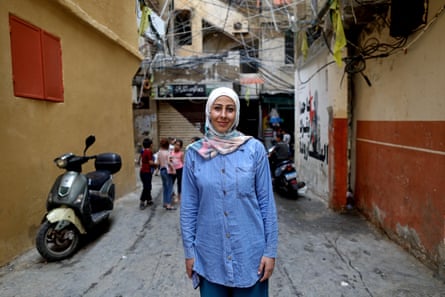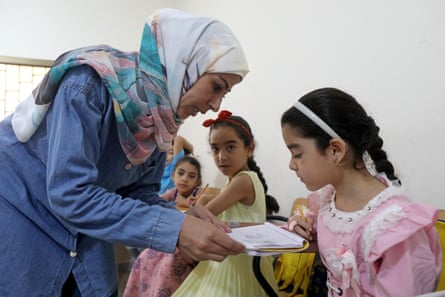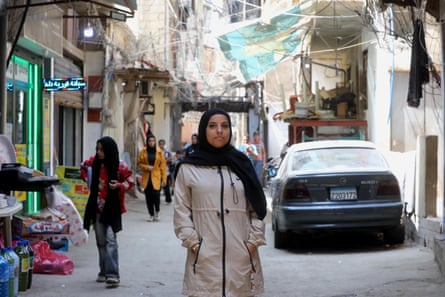The economic crisis and lockdowns have led schools to shut and pupils to drop out, but homegrown solutions are emerging to fill the gap
The Shatila refugee town on the outskirts of Beirut measures 1 sq km and houses more than 14,000 refugees. It has been home to Batool Ghanem for a third of her life.
Since fleeing the Syrian war in 2011, Ghanem has learned to navigate the settlement’s narrow, winding streets and pebbly ground by heart, as well as the tangled web of electricity wires dangling between its buildings over people’s heads.
But it was not until her daughter began going to school that she noticed that many of the other more than 650 children in Shatila did not attend.
“They were on the streets when I walked my own daughter to and from school. I asked why they weren’t in class, and their parents’ matter-of-fact response was, ‘they just don’t go,’” she says.

Lebanon, which is experiencing what the World Bank has described as “one of the most severe crises episodes globally since the mid-19th century”, hosts the world’s largest number of refugees per capita.
The crisis, which has slashed 97% off the value of its currency, the lira, since 2019, has had a severe impact on 1.5 million Syrian refugees living in the country. With nine out of 10 Syrian refugees living in extreme poverty, education has become a luxury most are unable to afford.
“It was so sad. Kids of 14 and older could not read – and I had the time to help,” says Ghanem. “I had resigned as an assistant in a dentist’s clinic for my kids, and now had time on my hands. So, I made that my cause.”
The crisis has left Lebanon’s education system high and dry. As teachers’ salaries have lost about 90% of their value, frequent strikes and resignations have kept public schools shut for most of the year, and many closed down altogether in the past three years because they could not afford running costs.
Refugee children face additional barriers including “xenophobia, limited spaces in public schools, lack of civil documentation and limited pathways to transition to formal education”, according to the UN agency for refugees (UNHCR).

In August 2020, Ghanem transformed a small room at her husband’s photography studio in Shatila into a classroom. She knocked on neighbours’ doors, inviting their children to come for two hours every day. “There were no desks, and students rested their books on their laps. But they still came with an eagerness to learn reading, numbers and song,” she says.
As more children came, she extended her teaching hours and volunteers arrived to help. With funding from the Austrian NGO Caravan of Humanity, a centre was set up, with 19 staff, 50 desks and three blackboards. “To date, we’ve taught about 300 children between six and 16 in the Oxygen centre. We named it that because learning is just as important [as oxygen],” she says.
Nada Zubara, 10, was four when she left Syria with her family and had never set foot in a school. As she proudly shows a certificate from the Oxygen centre for coming first in a test, she says: “I dream of being a teacher, and today I’m one step closer to that. Before coming to the centre, I could not write my name, but now I read street signs to my mother.”
Another mother, Rajaa, says her 11-year-old daughter, Rahaf, is delighted to attend the classes. “We live in a compact and crammed place, and Oxygen is the one venue where my daughter can be herself – a child,” she says.
Half an hour’s walk away, in the heart of Beirut, 31-year-old Mervat Akar lives in Burj al-Barajneh refugee camp, another place with limited resources and sweeping poverty, overcrowded with about 31,000 refugees. Most are Palestinians and more than 2,500 are children.

Children in the camp can attend public schools only after all Lebanese applicants have been accepted. As more Lebanese families have transferred their children into public rather than private schools because of the financial crisis, fewer spaces are available for refugees.
Majda Naguib, a founding member of the Najdeh Social Association set up in 1976 to support Palestinian refugees in the camp, says: “The difficult socioeconomic situation left people struggling to survive, and increased the number of working children.”
She said four schools run by the UN had served children in the camp until the pandemic ushered in online schooling, which many families and children lacked the technology to access. The number of school dropouts has not recovered since, she said.
It was during one Covid lockdown when Akar noticed a change in her own three children. “I used to homeschool them all through the pandemic and as schools closed their doors. But they had no place in the camp to relieve their energy, and I noticed an increase in their aggressive attitude and stubbornness,” she says.
Akar, a business administration graduate, says she felt upset that “a whole generation of children would miss out on the opportunity to learn and interact with society”. She soon noticed that other parents were seeing a similar deterioration in their children’s behaviour, and she decided to act.
Initially, she organised activities such as inviting children to gather in the camp’s football field. The first meeting drew “an astounding turnout of 80 kids”, she says.

Akar moved the meetings to her home, where she “merged fun with education, teaching children numbers and letters through play”, she says. She made numbers, shapes and letters from waste plastics and cardboard and soon there was a makeshift school on the roof of the house. But it was clear she needed financial backing.
“Local entities refused to aid the initiative, as it was not officially registered. I did not give up. I would not: the happiness we were bringing into children’s lives was too valuable,” she says. “Instead, I contacted more than 50 international donors, and heard back from Caravan of Humanity.”
In April 2022, the Together We Can centre was launched with eight volunteers to educate 180 children, she says. “And the number keeps growing, which is what we would want it to do.”
Source : The Guardian
















